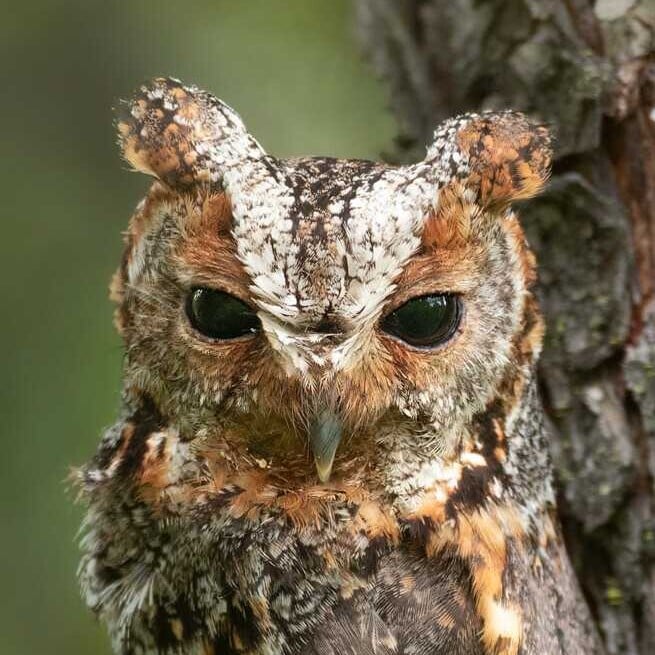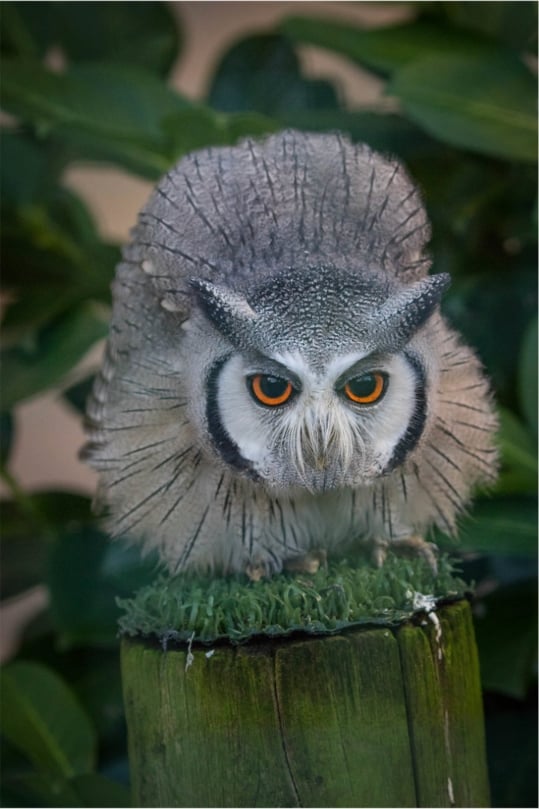Came across this fun little article about owl words and French slang.
From TheLocal.FR
This French word can help you express positive feelings toward someone or something, and differentiate different types of owls.
Why do I need to know chouette?
Because it’s a very useful word you can use to describe something that you like or you think is nice or cool. But it’s also the name for a big-eyed nocturnal bird.
What does it mean?
Chouette - roughly pronounced shoo-wet - is the word for ‘owl’ in French, but not all owls.
There is another French word for owl - hibou - which refers to the species that has aigrettes (Plumicorns), which look like ears, on top of their heads, while owls of the chouette category do not.
Within the chouette category, you might hear about la chouette effraie, the barn owl, and la chouette lapone, the great grey owl.
A further fun owl fact is that French also has two different words to describe the noises they make - chuintement refers (among other things) to an owl screech, while hululement is used for the ‘twit twoo’ cry of a barn owl.
But while discussing owls is always fascinating, you are more likely to hear the word chouette in its more slangy form - it can be used as an adjective to describe something or someone that’s ‘great’, ‘nice’ or ‘pleasant’.
While the word is informal, it is not offensive, so don’t be afraid to use it around children (or your in-laws).
Chouette also has a very common usage as an interjection to express satisfaction about something: Chouette! Mon colis est arrivé! (Great! My package has arrived!)
In this way, it is similar to saying ‘ace’ or ‘sweet’ in British English.
There are also expressions that use the word chouette, such as Machin chouette, which you use to refer to someone whose name you can’t remember, in the same way as ‘thingummy’ or ‘thingamabob’ in English.
And perhaps the most pejorative usage of chouette but one that may come in handy occasionally is using it to describe a grumpy old lady or hag, une vieille chouette.
If you’re looking for alternatives you can say c’est super! or cést genial! to describe a situation or outcome you’re happy about. For people, you could say sympa instead of chouette.
As for its origins, the word first appeared in France around the Middle Ages, as the now lost verb choeter, which meant to be/act trendy or smart.
French Renaissance writer François Rabelais was among the first people to use chouette in writing when describing his wife as une belle petite chouette, showcasing how it is definitely a compliment to be associated with the nocturnal bird of prey.
Use it like this
On a passé une chouette soirée - We had a pleasant evening
Il est un chouette garcon - He’s a nice/friendly kid.
Vous allez faire de la randonnée pendant un mois ? C’est vraiment chouette. - You’re going hiking for a month? That’s really cool.
This is a certified chouette post 😎👍
Très bien!
So Duolingo is lying to me when it makes me say Duo est une chouette? He’s got the little ear thingies, he should be un hibou, non?
I would say so, that duoliguo character is a “Hibou” owl ; not a “Chouette” like Harry Potter’s Edwig
Last time I discussed this with @pseudo@jlai.lu , this is what they explained.
Generally, I’m calling hiboux the ones with a sharper face feature and longer body but I’m calling chouettes, the one with rounder face or body. This criteria is not perfect. Sometime, I see a picture of an unknown type of owl and I wonder “Is this a chouette or a hibou ?”.
According to wikipédia :
le hibou, appelé aussi chat-huant, se distinguant de la chouette par la simple présence d’aigrettes, faites de plumes dépassant de la tête.
Which translate into
the owl, also called hooting cat, are distinguished from the owl by the simple presence of egrets, made of feathers protruding from the head.
I would take that as Duo should be a hibou (it seems the -x makes it plural). Looking over some threads on the Duolingo forums, the users seem to have come up with the belief that the app sees hibou as masculine and chouette as feminine, but takes that as the words for a male/female owl rather than just as gendered nouns. The consensus seemed to say that was not correct in practice though, so it still sounds like Duo is hibou no matter what, due to plumicorns/egrets.
I would take that as Duo should be a hibou (it seems the -x makes it plural).
I just googled the Duolingo mascot, and yes, I would definitely it a hibou, it’s very weird that they call it a chouette.
…Fun fact (that is, fun unless you’re a French-speaking second-grader?): French nouns ending in -ou take -s as their plural mark, like the vast majority of words, with the exception of seven† words that take -x as their plural mark: bijou (jewel), caillou (stone), chou (cabbage — can also be a term of endearment), genou (knee), hibou, joujou (a childish word for “toy”, diminutive from jouet), and pou (louse).
There is no rational or historical‡ reason, no justification for why these specific words have to end in -oux instead of -ous, it doesn’t change the pronunciation in any way, we could all decide to write hibous tomorrow and it would break nothing whatsoever in the French language… yet we must all learn this list in primary school, often with the aid of sentences such as “viens mon chou, mon bijou, mon joujou, sur mes genoux, et jette des cailloux à ce hibou plein de poux” (Come, my sweetheart, my jewel, my little toy (?), on my knees, and throw stones to this owl full of lice).
†: It could be more than seven, but that’s up to debate. The plural for some words in -ou isn’t entirely fixed. One example of such a word is ripou (dirty cop), whose plural is sometimes written ripoux, sometimes ripous. Thankfully, since schools don’t teach that word to seven year old kids, teachers don’t have to worry about whether to include it in The List.
‡: There is a general historical reason for plurals in -x, they come from medieval copists who used a cross symbol as an abbreviation for an ending in -us, and a non-negligible minority of French words have a plural in -x, but there is no reason why these seven words should work this way, it’s just a weird tradition as far as I know.
I swear I didn’t make all that up.
Thank you for going into such detail! I saw it mentioned the -x was the exception to the rule, but I didn’t know what the time was or why it was an exception, and you explained it wonderfully!
That sentence is pretty wild, but I suppose you can only do so much to use all those words. I hope the stone cures the owl’s lice. 😁
I’ve seen the owl with an without the -x, so now I understand why. I’ve also seen Bijou (celebrity name), Caillou (much hated children’s TV character), choux (recipe name), so it’s nice to know what they all mean now.
Wow, I had completely forgotten about Caillou. Apparently, the cartoon was imported in France when I was still a child, but already too old to be watching it. I have no idea if it’s reviled here too. I always assumed he got his name from his lack of hair, but I might be wrong.
Funnily enough, the wiktionary page about the weird mnemonic sentence bears a note (with a ⚠️ warning sign!) saying that it is not to be taken as an invitation to throw stones at an owl, whether or not it has lice.
That’s a crazy coincidence if one non french-speaking person just called a bald character with a french slang for bald head. I would have thought it is french or the name was translated to a pun for the french version.
Caillou was created by a Quebecer illustrator, so not French, but still French-speaking. The publisher for Caillou claims that he was named after a practice of Françoise Dolto of making her child patients give her a little stone as payment, but I’m not 100% convinced, ha ha.
And apparently, the editor for the Caillou books is called “Éditions Chouette”, which is too big of coincidence, so I guess there really is a great international owl conspiracy.
We’re onto something!
I’m not much familiar with Caillou, but I’ve heard all my friends that have kids or have worked in childcare talk about what an annoying kid he is. It makes sense what his name means now, I always thought it was just some made up name that was easy for kids to say when they can’t speak too clearly yet.
I am glad the wiki is keeping the safety of owls in mind. Very thoughtful! 😆
Tu fais comment pour mettre les petites signes qui te servent à marquer les notes ?
Je les copie-colle, ils ne sont pas présents dans ma disposition de clavier (pour autant que je sache). Ça s’appelle un obèle, tu peux les retrouver rapidement en cherchant l’article Obèle ou Note de bas de page sur Wikipédia. Personnellement, j’utilise plutôt une table de caractères, Gucharmap sur mon ordinateur et UnicodePad sur mon téléphone portable, où je les cherche avec un de leurs noms anglais (dagger ou obelisk).
Sinon, tu peux les entrer manuellement avec Unicode (U+2020 et U+2021), mais personnellement je ne les utilise pas suffisamment souvent pour m’en souvenir.
I’m French and I’ve actually learned a few things by reading this post! C’est chouette. :-)
I always nervously await corrections when I share something I read about another culture, since I never have a clue if it’s right or not.
One more reason I always cite sources! If it’s wrong, take it up with them! 😆
Merci pour le partage <3
Between the big hiboux and the explaination about chouette, the last articles seems to be made just of meWell I was of course thinking of you when I shared this one!
“shoo-wet” / “saw whet”?
I think you may be on to a great international owl conspiracy! 😮😆
I think of it closer to “sweat” but more accurately as in the SNL “Schweddy Balls” skit but with Ts instead of Ds.
Cowlincidence?!?! I think not!




